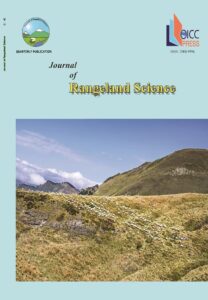Effects of Planting Date and Biofertilizer on Seedling Growth of Thymus daenensis Celak and T. vulgaris L. Cultivated in Borujerd, Iran
Authors
Abstract
Seedling establishment is a crucial stage in the restoration of degraded rangelands. The effects of sowing dates and bio-fertilizers on the growth and establishment of Thymus daenensis Celak (native) and Thymus vulgaris L. (introduced) were studied over two growth seasons at Islamic Azad University, Borujerd branch, Lorestan, Iran. The treatments consisted of four bio-fertilizers treatments i.e., mycorrhiza fungi, nitrogen-fixing free-living bacteria (NFB), phosphate solubilizing bacteria (PSB), and a control group, two species of Thymus sp. and two transplantation dates (November 2017 and March 2018) were also included. PSB and NFB (50 mm/lit of dissolved water) as well as mycorrhiza were applied twice: once during seed sowing in pots and again after transplanting the seedlings in the field. The results demonstrated that T. vulgaris exhibited superior performance (ranging from 31.8% to 51%) in various plant traits such as height, canopy cover, leaf area, dry leaf weight, dry shoot weight, aerial dry weight, root dry weight, shoot-to-root ratio, and root volume compared to T. daenensis. The transplantation date did not significantly affect seedling survival rate and shoot growth. However, seedlings transplanted in November had a higher root-to-shoot ratio (0.94), root dry weight (3.48 mm), root volume (3.56 m3), main root length, and mycorrhiza colonization (11.4%). In exceptionally wet year in in 2018, T. vulgaris performed better than T. daenensis. However, we anticipate T. daenensis to outperform T. vulgaris during normal and dry years, particularly with the application of PSB biofertilizer in its root medium. We recommend simultaneous comparisons of plant growth and thymol concentration under various cultivation and/or biofertilizer treatments on Thymus species in future studies.



